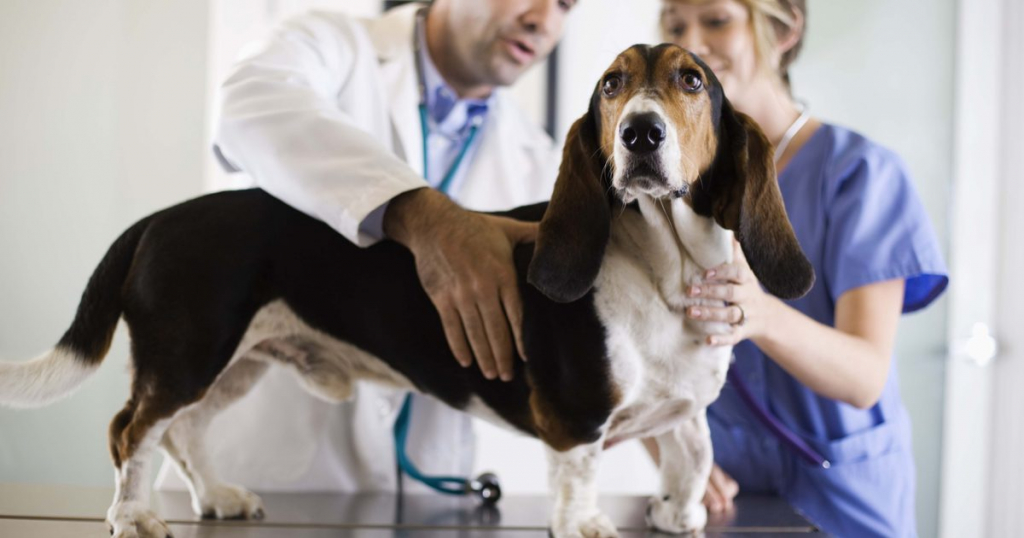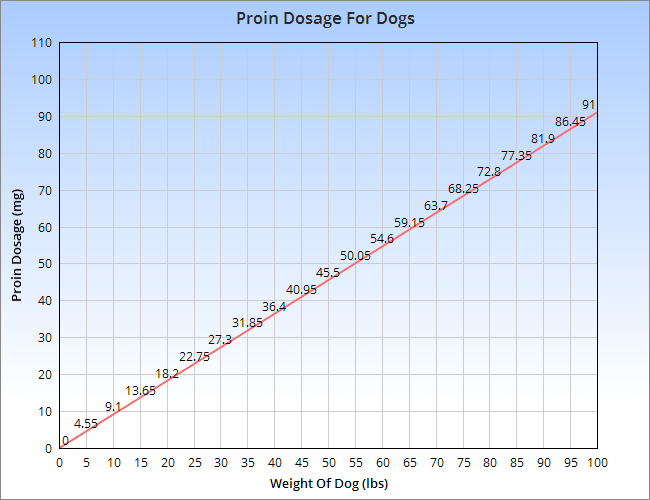Proin (phenylpropanolamine hydrochloride) or (PPA) is prescribed for the management of urinary incontinence in dogs. It will not cure incontinence, but manage it, to make life easier for your pooch.
What is Proin?

Proin is the non-proprietary designation for benzene methanol.
Scientific formula: α-(1-aminoethyl)-, hydrochloride, (R*, S*)-, (±).
The empirical formula is: C9H13NO • HCl, and the molecular weight is 187.67.
It is a white crystalline compound having a slight aromatic odor. PPA is freely soluble in water and alcohol but is practically insoluble in ether, benzene, and chloroform. [3]
Proin strengthens and tightens the urinary sphincter
Proin is a sympathomimetic amine. It is available in a tasty liver-flavored chewable tablet. This medication strengthens and tightens the urinary sphincter. It is a supplemental adrenergic agent, in that it mimics adrenaline or epinephrine.
These hormones trigger the constriction of blood vessels. Proin is only available with a veterinary prescription. Proin is classified as a controlled substance in Arkansas, Iowa, Illinois, Louisiana, and Oregon.
What is Proin used for in dogs?
Dogs that suffer from incontinence have the inability to prevent or control urination. Urinary incontinence in dogs is the inability to avoid or control urination. Dogs that suffer from incontinence leak urine regularly, or on and off without realizing it, or without having the ability to stop it.
They may leave a pool of urine in their dog beds or possibly dribble urine while walking or running. The constant release of urine may cause inflammation and urine scalding of the skin around a dog’s sensitive areas.
Urge incontinence will occur when dogs feel the need to urinate, and the urine will leak. It is caused by the irritation of the bladder muscle that forcibly expels urine, and is most often caused by the inflammation of the bladder.
Deficient levels of sex hormones in male neutered dogs are usually a contributing factor, which is called hormonal-responsive urethral incompetence in female dogs. Additionally, incontinence that results from congenital disabilities or malformation of the urinary system begins when a dog is young.
Furthermore, a dog can also become incontinent if the urethra is partially blocked and the blocked urethra then backs up the urine which causes the dog’s bladder to overflow.
Benefits of Proin for dogs
The primary goal of prescribing Proin for your dog is to help manage urinary incontinence, but additional benefits include the following:
- reduction of ‘accidents’ in the house, and possible elimination of them
- minimized incidents of redness and irritation around the dog’s privates
- maintaining balanced phenylpropanolamine levels.
In a study published with the FDA, Proin was administered at 2mg/kg orally twice daily. The study concluded:
“Proin was effective for the control of urinary incontinence based on a decrease in urinary accidents per week as compared to placebo.”
When should Proin not be prescribed?
Certain pre-existing conditions will exclude your dog from being able to receive Proin to treat incontinence. These include:
- Glaucoma
- Prostatic Hypertrophy
- Hypertension
- Hyperthyroidism
- Diabetes
- Cardiovascular Disorders
What info will my vet require?

Veterinarians prescribe Proin for canine urinary incontinence.
Before prescribing Proin, your veterinarian will most likely begin discussing alternative treatment options. He or she will recommend and advise you about the specific disorder, and the suggested drugs that will be needed to treat the disease.
You will need to thoroughly discuss with your veterinarian any:
- medications
- prescriptions
- over-the-counter
- or herbal supplements that you are giving your dog.
Most importantly, you will need to prepare yourself in advance should there be any side effects that would require immediate emergency veterinary care. Even if Proin seems easy enough to use, or you’ve given this to your dog in the past, it’s still important to follow all instructions carefully. Correct dosages must be administered at all times.
Inform your veterinarian if your dog is pregnant, lactating or if she used for breeding purposes, as these dogs will not be able to receive a prescription for Proin.
Proin dosage for dogs

Sometimes giving medications to dogs can be complicated and confusing. Proin is an FDA-approved, chewable, liver flavored tablet that is used for the control of urinary leaking in dogs.
That said, it is recommended that dogs be given Proin at:
- 0.4 to 0.8 mg per pound of the dog’s body weight,
- and the recommended frequency is every 12 hours.
Proin is available in:
- 25 mg
- 50 mg
- and 75 mg chewable tablets.
The exact dosage needs to be adhered to according to veterinary recommendations. The goal of dosage is to minimize the potential for adverse reactions in dogs.
Missed doses
Never double up on a missed dose of Proin.
Should you miss the one dose, administer it if there are a couple of hours in between until the next treatment. That said, veterinarians recommend waiting until the next succeeding dose to be given to the dog as scheduled, if the gap between succeeding doses is too short.
Consult with your veterinarian to confirm dosing schedules for Proin, most especially if you’ve missed one.
Overdose symptoms
Common signs of Proin overdoses or poisonings include the following:
- high blood pressure
- rapid heart rate
- seizures
- coma
- death.
Contact your veterinarian immediately if your dog has accidentally ingested additional Proin chewables. Many dogs have chewed through the closed vials, so be sure to keep all medication out of your dog’s reach.
Side effects of Proin for dogs
 As with any medication, Proin comes with a few side effects that dog owners should be aware of and keep a close lookout for. Some adverse effects may present as follows:
As with any medication, Proin comes with a few side effects that dog owners should be aware of and keep a close lookout for. Some adverse effects may present as follows:
- restlessness
- hyperactivity
- pale gums
- urination problems
- hypertension
- irritability
- decreased appetite.
There are times that side effects go beyond the “norm,” and if you’re administering Proin to your dog, you’ll need to be on the lookout for the following additional severe side effects:
- emesis
- anorexia
- weight loss
- proteinuria (abnormal quantities of protein in the urine)
- behavioral changes.
Possible drug interactions with Proin
If your pooch is already on other medication, there might be a reaction if Proin is included in his regimen. It is not recommended if a dog is already taking the following medications:
- Ephedrine
- Epinephrine
- Anipryl
- Selegiline
- Preventic collar
- NSAIDs
- Reserpine
- Tricyclic antidepressants
- Amitraz
- Promeris flea collar
- Ganglionic blocking agents
Final thoughts on helping your dog with incontinence

As a pet parent, you need to inform yourself as to how Proin works and of any adverse effects that might occur. Keep in mind that minimizing stress in your dog has to be top priority! We put this guide together to help you achieve just that, but remember, always consult with your veterinarian as to the best options available.
While Proin is relatively safe and benign, there are still side effects that you need to take into consideration. A fact sheet from UC Davis Veterinary Medicine explains that: “Phenylpropanolamine (PPA) is currently the drug that results in helping with incontinence in most dogs. Side effects in dogs include restlessness, anxiety, hypertension, and tachycardia. This class of drugs is not recommended in patients with cardiac disease or hypertension.”
A study published in the Veterinary Practice News in 2016 adds that “Our clients, of course, want reliability, safety, and ease of administration,” said Nichol, a consultant for the drug’s maker, PRN Pharmacal of Pensacola, Fla. “It is catecholamines that directly control urethral muscle tone. Proin contains phenylpropanolamine, an alpha-adrenergic agonist, that stimulates proximal urethral alpha receptors. Clinical response has been reported as excellent in 75 to 90 percent of affected dogs treated with Proin.”
